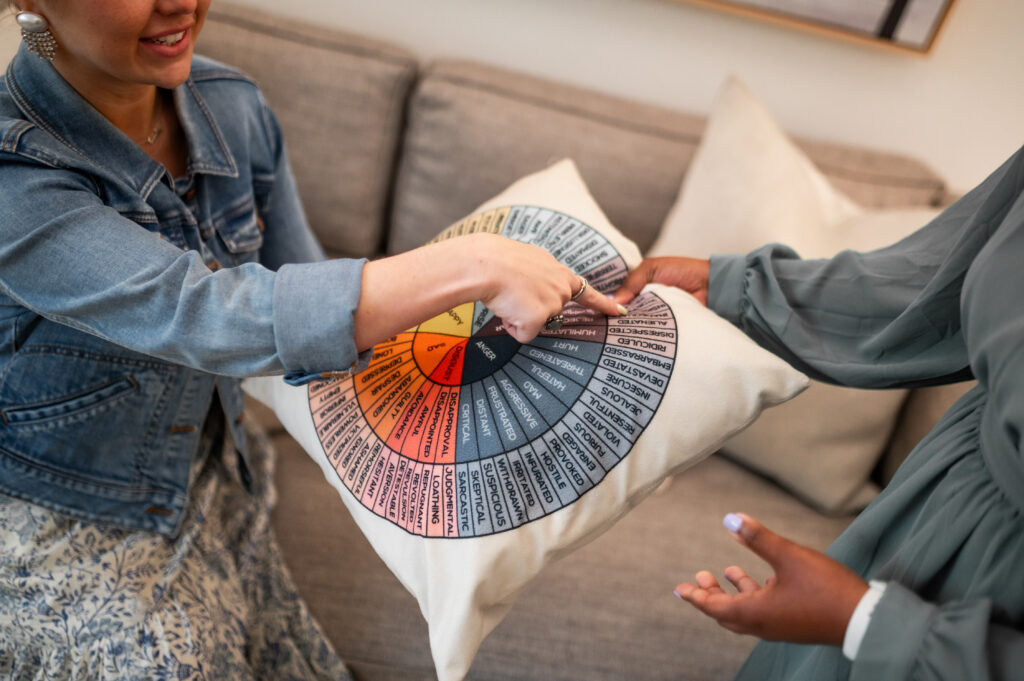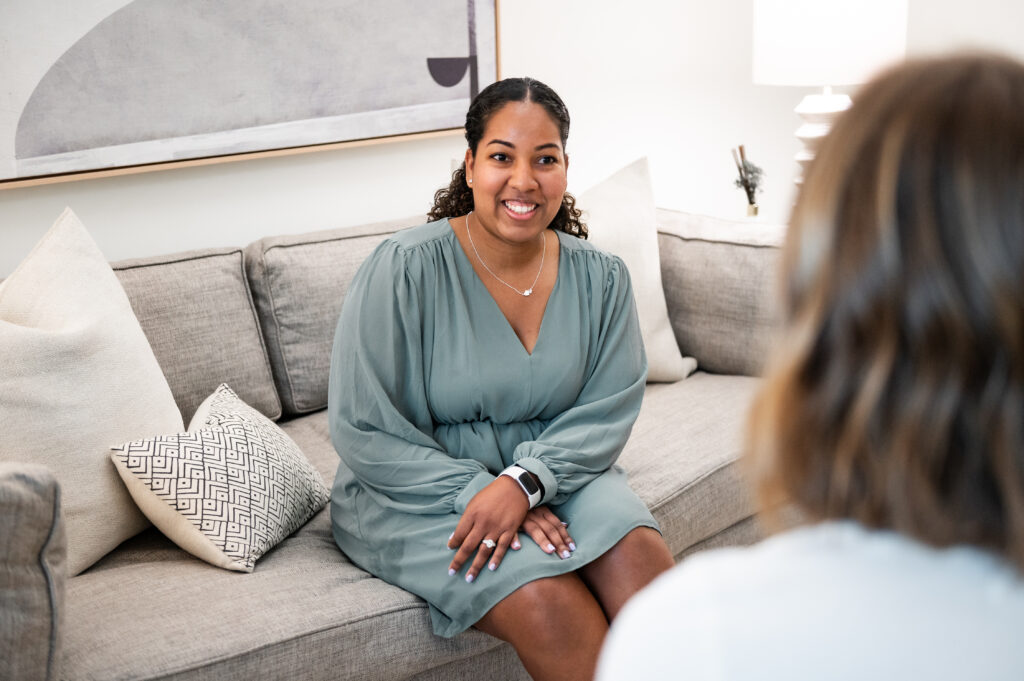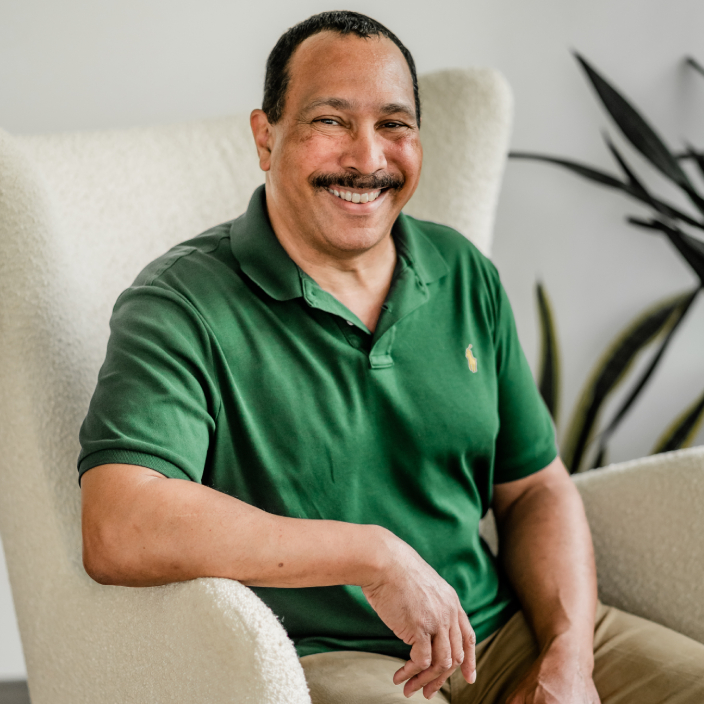What Does Bereavement Counseling Involve?
The best way to find out if this approach is for you is to schedule a 15 minute consultation. Depending on your clinician’s availability, this consult may be held over the phone, via video, or in-person.
What is Bereavement Counseling?
Bereavement Counseling is a form of therapy used when someone who has experienced the death of a loved one processes their emotions to make a plan for moving forward in life. Some ways bereavement counseling can help are guiding people in developing coping skills, providing social support systems, or connecting them with appropriate services or support groups.
At KMH, our mental health professionals offer grief counseling services for those who are coping with losing a loved one. We work with you to develop a plan that is right for your specific situation and needs. Our counselors will guide you through the process to find healthy ways of coping with this change.
As a team, we provide support and expertise in grief therapy. Our grief counselors are trained in the principles of loss and bereavement counseling. We provide individual, couples, family, or group counseling for adults, and adolescents.
At KMH our clients come first! We boast a progressive approach that combines current ideas & theories on how people can recover from painful experiences while maintaining their own personal growth.
If you’d like to know more about what we do at KMH, please give us a call today for a phone consultation and see if we are the right practice for your needs.
Your life has been changed forever by the loss of your loved one. Bereavement Counseling can help you learn to grieve with hope instead of despair.
The Difference Between Bereavement and Depression
Both bereavement and depression are recognized as mental health conditions that can cause difficulties in functioning. Depression is often experienced as general sadness, hopelessness, emptiness, loneliness, worry, anxiety, anger, physical pain, or lack of concentration or motivation. It may affect basic tasks like eating or sleeping. Bereavement is the feeling of great sorrow over death/dying and loss. It also involves the many changes that occur in a person’s daily routine.
Grieving is what most people do when coping with loss, even if their loss was expected. It is not unusual for bereavement to trigger feelings of depression. When you are already sad over your friend or family members’ death, it may seem impossible to find any joy or hope right now. However, it is vital to keep an eye out for complicated grief.
Prolonged Grief
Prolonged grief, also known as complicated grief, is an unfortunate but all too common mental disorder in which a person’s life becomes consumed with the traumatic grief experience of losing someone close to them. This form of intense emotional pain can last for years and can be easily misdiagnosed as depression. The symptoms of complicated grief include:
- Feelings of despair
- Hopelessness
- Continued thoughts about the loss of the way the loss happened (Rumination)
- Feeling emotionally empty
- Yearning to reconnect with the deceased
- Avoiding people, places, and things that bring the deceased to mind
- Confusion about self-concept
- Isolation
- Loss of interest in things you once enjoyed.
When is the Right Time to Seek Treatment When You Feel Stuck in the Stages of Grief?
It can be hard to know when you’re ready to seek treatment for your grief. Our team has seen so many people go through the grief process, and we have worked with them to get through it. It’s not easy, but there is hope! You can get back on track and start feeling human again with therapy or other treatments that will help you heal from your loss.
If you feel stuck in the grieving process (that means no matter how much time passes, you don’t seem to move past a certain stage), then it might be worth considering seeing someone who specializes in this area of mental health care to see what they recommend. You deserve compassion and understanding while going through one of life’s most difficult experiences.
Understanding the Grieving Process
When a loved one passes away, or loss of any kind is experienced, it’s not unusual to feel a range of emotions. Grief is a normal part of life, but it can feel overwhelming at times. You may feel a deep sense of sadness, and your thoughts may be consumed by memories of your loved one.
You might have moments where the pain feels unbearable. And at other times, you may feel numb, as though you’re moving through life in a daze.
These feelings are all common among bereaved people, and they represent the body and mind’s ways of accepting the loss. It’s important to understand that everyone’s grieving process is unique.
There’s no right or wrong way to grieve, and the process may take longer for some people than for others. However, there are strategies that can help you cope during this difficult time.

Providing a Safe Space
One of the most beneficial aspects of bereavement counseling is that it provides a safe space for you to express your feelings without judgment. It can be incredibly healing to openly talk about your loved one, sharing your memories, your regrets, and your fears about the future without them.
Our mental health professionals are here to listen, empathize, and guide you through these difficult conversations.
At KMH, we foster an environment of understanding and acceptance. We’re here to affirm your feelings, and we encourage you to be open and honest with us.
It’s okay if you don’t have all the answers. It’s okay if you feel lost or confused. This is a safe space for you to navigate your grief journey at your own pace.
Learning Healthy Coping Mechanisms
Bereavement counseling is about more than just talking through your feelings. It’s also about learning practical coping mechanisms that can help you deal with the day-to-day challenges of your loss.
These coping mechanisms can be tailored to fit your unique needs and circumstances. For example, you might find solace in writing in a journal, expressing your feelings through art, meditating, or spending time in nature.
Physical exercise can also be a beneficial outlet for your emotions. Our counselors can help you identify the activities that bring you comfort and incorporate them into your regular routine.
Additionally, you might benefit from strategies to help you manage moments of intense grief, such as deep-breathing exercises or mindfulness techniques. By having a toolbox of coping mechanisms at your disposal, you can better navigate the ups and downs of the grief process.

The Value of Grief Support Groups
While individual therapy is valuable, many people also find comfort in connecting with others who are going through a similar experience. Grief support groups can offer a sense of community and understanding that’s hard to find elsewhere.
They provide a platform for sharing personal stories, offering mutual support, and learning from others who are navigating the journey of grief. While KMH doesn’t offer grief support groups, we can certainly help you find local or online groups to enhance your healing process.
Navigating Life After Loss
with time, patience, and the right support, you can learn to live a fulfilling life after loss. At KMH, we’re committed to walking alongside you on this journey. We aim to help you honor your loved one’s memory while also embracing the possibilities of the life that lies ahead.
Remember, it’s okay to feel happy and hopeful again. It’s okay to laugh and enjoy life, even as you miss the person you’ve lost. These aren’t signs that you’ve forgotten your loved one or that their memory is fading. Instead, they’re signs of healing, growth, and resilience.
If you’re navigating the complex journey of grief and loss, know that you’re not alone. KMH is here to provide the guidance and support you need. Reach out to us today and begin the journey toward healing and acceptance.
Bereavement Counseling with KMH
Bereavement counseling helps many people when coping with loss, even if their loss was expected. If you’re in a rut in your grieving, it’s worth looking into receiving professional bereavement counseling from someone like KMH’s licensed mental health professionals.
We have worked with many different people from all walks of life, and we have what it takes to help you get through what you’re going through. Reach out today for a phone consultation to learn more about how we can help you.
 Counseling
Counseling
Individual Counseling Session Rates
Sessions are available in 45 or 60-minute formats and can be conducted either in person or via video.
Initially, appointments are typically scheduled every week or every other week, but once symptoms are managed and progress towards goals becomes more consistent, they can be spaced out to every 3-4 weeks.
45 minute appointments: $160 – $180 per session
60 minute appointments: $215 – $240 per session
Individual counseling rate varies per clinician. Please see clinician bios for more information regarding specialties and rates.
Therapists Who Offer Bereavement Counseling
Frequently Asked Questions
How do I schedule an appointment?
If you are a new client, you may schedule your consultation or your initial appointment by visiting the contact page and filling out the short form or by calling (470) 231-5355 and speaking directly to our client care coordinator.
All outreaches are returned within 24 hours, during business hours.
Do you accept my insurance?
KMH does not accept insurance. Managed care companies were created to “manage” and contain escalating health care costs. Their bottom line is to reduce costs and raise profits; it is not to increase the quality of care professionals provide or your quality of life. KMH is solution-focused on quality of life and personal goals.
What is your cancellation policy?
If you need to cancel or change your appointment, we ask you to inform your provider at least 24 hours in advance of your scheduled session start time. Your full session fee will be charged for missed appointments and cancellations received less than 24 hours in advance.
What forms of payment do you accept?
Cash, credit cards, and health savings (HSA) or flex spending account (FSA) cards that have a major credit card logo on it are all accepted forms of payment.








